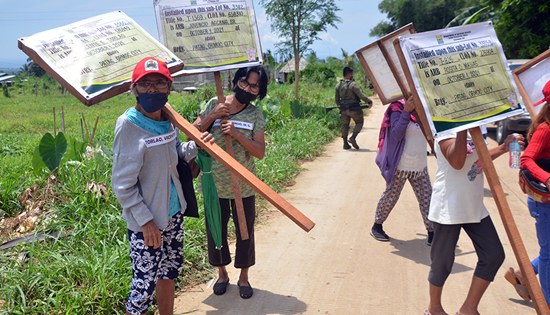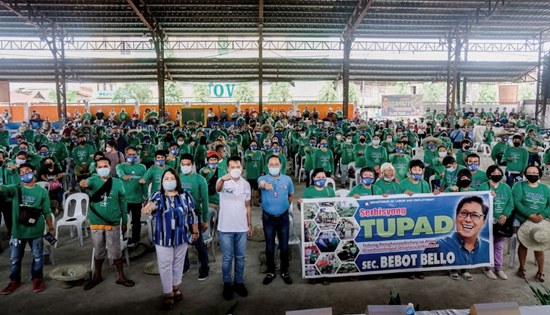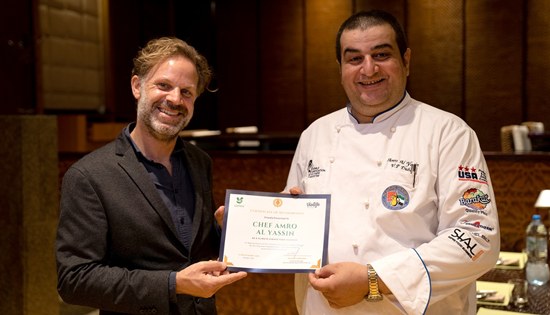UP Diliman
Chancellor, UP library vow to stand against book censorship

By
CONTEND-UP
October 31, 2021
QUEZON CITY – UP
Diliman Chancellor Fidel Nemenzo, Ph.D in a forum on book censorship
and academic freedom last Friday, 29 October 2021, strongly
condemned attempts by the military and the NTF-ELCAC to remove books
that are deemed “subversive” from the libraries of universities and
colleges in different parts of the country.
“Mariin tinututulan at
kinukundena ng UP Diliman ang ginawang pagtanggal ng militar sa mga
sinasabi nilang subersibong libro, dokumento, at materyales ng ilang
state university libraries. Ito'y paglabag sa kalayaan ng mga
pamantasan na makapagturo, magsaliksik, at magpalaganap ng kaalaman
nang malaya at walang kinatatakutan,” said Nemenzo.
“Desisyon natingmga guro
kung ano ang ipababasa o hindi ipababasa sa ating mga estudyante, at
ang tamang desisyon ay ipabasa ang lahat. Gusto natin ay buksan ang
kanilang isipan para makita nila ang lahat ng ideya, lahat ng punto
de bista, lahat ng alternatiba,” said Nemenzo.
UP Diliman's stand comes
in the wake of the latest attempts to clampdown on academic freedom
with the Commission on Higher Education (CHED) in the Cordillera
Administrative Region issuing regional memo nos. 113, series of 2021
calling on all universities and colleges to surrender so-called
“subversive” books and materials to authorities. UP Visayas
Chancellor Clement Camposano has previously made a stand against
book censorship.
Chancellor Nemenzo
describes the removal of books and readings as a form of censorship,
violence, and repression of ideas: “Ang kanilang mga aksyon sa mga
pamantasan ay lalo pang nagdudulot ng takot sa ating mga estudyante.
Tinatanggalan sila ng kalayaang mag-isip, magtanong, at magsaliksik,
kalayaang tumuklas ng kalayaan batay sa kanilang sariling kakayahan,”
he said.
Former UP Faculty Regent
Ramon Guillermo, Ph.D, said the military intrusion on libraries is a
concrete example of the intensifying attacks on academic freedom
under the Duterte administration, which he compared to state forces
repressing feelings and ideas that are not acceptable to those in
power. “Ang pagpasok sa aklatan ay talagang pagpasok sa puso ng
pamantasan,” he said.
“Sa pagtatanggol ng ating
mga aklatan, hindi tayong maaaring bumigay ng kahit isang centimeter
dahil kung bibigay tayo nang kahit isang centimeter ay sa susunod ay
magiging isang meter na yan. Pagkaraan ay magiging isang kilometer
naman. Hindi lamang sa isang iglap nawawala ang kalayaan,” said
Guillermo.
One of the highlights of
the forum is a discussion by UP Diliman's Deputy University
Librarian Eimee Rhea Lagrama on the martial law papers special
collection at the UP Diliman University Library.
These include the
Philippine Radical Papers, composed of banned documents, brochures,
flyers, manifestoes and clippings during the dictatorship years that
were secretly donated by individuals and anti-Marcos groups to the
library, and the SELDA Papers which includes legal documents, police
reports, eyewitness reports and other memorabilia on human rights
violations during martial law that were donated by the Samahan ng
Ex-Detainees Laban sa Detensyon at Aresto (SELDA).
Chancellor Nemenzo vowed
to protect these special collections and other library materials
from military repression to keep UP Diliman a “sanctuary of academic
freedom and ideas on peace and social justice.”
Amidst the fear and
intimidation wrought by the military on libraries, UP Diliman Head
Librarian Elvira Lapuz likewise called on librarians especially in
smaller state universities to stand their ground against attacks on
freedom of information and academic freedom.
Since September 2021,
books relating to the peace talks and other writings by
revolutionaries have been removed from the libraries at the Kalinga
State University, Isabela State University, Aklan State University,
and University of Antique at the behest of the military and the
NTF-ELCAC.
About two hundred UP
Diliman librarians, research, extension and professional staff,
faculty, and library sciences students attended the forum which
concluded in an online zoom protest with participants holding paper
placards with the calls #HandsOffOurLibraries and #DefendAcademicFreedom.
The forum was organized by
the University of the Philippines Diliman Office of the
Vice-Chancellor for Research and Development in cooperation with the
All-UP Academic Employees Union-Diliman and Congress of
Teachers/Educators for Nationalism and Democracy.
Widows among 33
agrarian beneficiaries installed in Ormoc
|

Widows
Rosario Torlao and Asuncion Agcang prepare for their
installation to the lots awarded to their late husbands under
the Comprehensive Agrarian Reform Program (CARP). |
By
JOSE ALSMITH L. SORIA
October 28, 2021
ORMOC CITY – Mixed
emotions was how widow Rosario Torlao felt when she was accompanied
by a survey team from the Department of Agrarian Reform (DAR) to her
late husband’s awarded lot under the Comprehensive Agrarian Reform
Program (CARP) as she and 32 other agrarian reform beneficiaries (ARBs)
were physically installed early this month and take full possession
of the land.
“Sobrang saya ko ngayon,
ngunit nalulungkot din dahil hindi na naabutan ng asawa ko ito,” (I
am now very happy, but at the same time sad because my husband never
caught up with this.) said Rosario, 65.
She added “Noon pa sana
ito nakatulong sa amin,” (This could have helped us long time ago.)
as she could not believe her family now owns an almost three-hectare
lot, which used to be a sugarland.
In 1997, Rosario’s
husband, Vicente, became a recipient of a certificate of land
ownership award (CLOA) covering a 2.9-hectare lot in Barangay Patag,
formerly owned by the Larrazabals.
But Vicente, according to
Municipal Agrarian Reform Program Officer (MARPO) Artheiriza Manalo,
failed to take full possession of the said land due to several
agrarian issues and disputes until he died in 2013.
Aside from Rosario, three
other widows, Teresita Caliwan (71), Asuncion Agcang (78), and
Trinidad Solayao (77) were also installed as they likewise took over
the place of their late ARB-husbands during the installation.
The four widows were among
the 33 ARBs, who now take full possession of their awarded lots
after having been physically installed following DAR survey teams
conduct of a perimeter survey. Many of them waited for this moment
for more than two decades.
Manalo disclosed that the
landholdings where the ARBs were installed were formerly owned by
the Larrazabals, Pongos and Pensergas.
Meanwhile, DAR Eastern
Visayas Regional Director Robert Anthony Yu expressed thanks for the
support and cooperation which led to the peaceful and successful
installation of ARBs both on September 22 and October 1 this year to
Philippine National Police Regional Director PBGEN Rommel Bernardo
Cabagnot as well as Ormoc City Director PCOL Ramil Ramirez,
Philippine Army’s 802nd Infantry Brigade Commander Zosimo Oliveros
and to Ormoc City Mayor Richard Gomez.
A total of 58 ARBs have
already been installed since September.
RD Yu, together with the
police and the military, believe this activity would contribute to
the government’s End Local Communist Armed Conflict (ELCAC) program.
Chiz condemns
‘online selling’ of Pinay domestic helpers on Facebook, Instagram
Press Release
October 27, 2021
SORSOGON CITY –
Sorsogon Gov. Chiz Escudero strongly condemned the trading of
Filipino domestic workers like commodities in the Middle East
through Facebook and Instagram and called on these popular social
media giants to take down immediately these “maid-selling” sites.
The sad plight of Filipino
helpers based in the oil-rich region came to light anew after they
told the Associated Press (AP), an American news agency, in an
interview that they were “sold” online by their employers to other
employers via Instagram or Facebook.
“Nakakakilabot,
nakakapanglumo at nakaka-high blood ang kwento ng mga kababayan
nating domestic helpers na dumaan sa mga maid-selling sites,”
Escudero said, referring to story which included accounts of some
Filipino domestic workers.
“Hindi po produkto ang
ating mga kababayan na mabibili sa Facebook Marketplace kasabay ng
mga basahan. Hindi rin po sila produkto sa mga online barter kung
saan puwede silang pagpasapasahan,” said Escudero, who once headed
the Senate Committee on Justice and Human Rights.
In an online article on
October 26, the AP disclosed that in 2019, technology giant Apple
almost pulled Facebook and Instagram out from its app store after
receiving reports about the social media platforms being used as a
tool to trade and sell maids in the Middle East.
Apple brought the matter
to Facebook, which also owns Instagram, and threatened to delete the
mobile apps in their digital store. After publicly promising to go
after the maid-selling sites, Apple relented and Facebook and
Instagram remained in the app store.
In the same report, the AP
said Facebook’s crackdown seems to have little effect because “even
today, a quick search for ‘khadima,’ or ‘maids’ in Arabic, will
bring up accounts featuring posed photographs of Africans and South
Asians with ages and prices listed next to their images.”
“Noong panahon ng slavery,
ang mga sinasabing alipin ay pinapahanay at pinipili ng mga magiging
master nila. Parang ganoon din po ang nangyayari ngayon. Kapag
nag-quick search po sa Facebook ang isang pamilyang nangangailangan
ng isang kasambahay, lalabas po doon ang kanyang picture kasama ang
kanyang edad at ang presyo ng kanyang pagkatao,” the former senator
pointed out.
Escudero urged the
government to conduct its own investigation on the AP exposé and
protest this despicable practice on the two social media platforms.
The veteran legislator
stressed that the plight of the overseas Filipino workers (OFWs) in
the Gulf states, especially the unskilled workers such as household
service and construction workers, needs to be addressed with urgency
as they are still bound by “kafala,” a sponsorship system that
monitors and restricts the migrant laborers’ movement.
In 2018, when Escudero was
still senator, he described this system as “modern day slavery” and
“involuntary servitude.”
Last April, President
Duterte has already called for the “complete abolition” of the
controversial scheme, branding it as “unjust” and “exploitative” as
it puts thousands of OFWs “in the most vulnerable situation.”
According to the January
2020 records of the Department of Foreign Affairs, there are about
2.2 million OFWs in the Middle East and North Africa. The top three
destination of our migrant workers are Saudi Arabia (865,000), the
United Arab Emirates (650,000), and Kuwait (242,000).
“Sa kagustuhan nilang
kumita para sa kanilang pamilya dahil kulang o salat ang trabaho at
oportunidad sa sariling bansa, nagiging subject sila ng iba’t ibang
klase ng pang-aabuso. Sa kabila ng kanilang pagtitiis at pagkawalay
sa kanilang mga mahal sa buhay sa gitna ng pandemya, ganito pa ang
nangyayari sa kanila,” Escudero lamented.
2,716 workers
benefit from 10 million TUPAD grants in Calbayog City

By
NORMA RAE S. COSTIMIANO
October 26, 2021
CALBAYOG CITY – A
total of P10,065,496.00 grants under the Tulong Panghanapbuhay
para sa Ating Disadvantaged/Displaced Workers or TUPAD program of
the Department of Labor and Employment have been availed of by some
2,716 informal sector workers in this city.
In a payout held last 14
October 2021 at Brgy. East Awang Covered Court, TUPAD beneficiaries
received P3,250.00 each as payment for their services rendered
during the ten-day program implementation.
Aside from the wages, all
beneficiaries were provided personal protective equipment,
disinfection materials and coverage to micro accident insurances.
Beneficiaries were so
thankful and expressed their heartfelt gratitude for the assistance
received through TUPAD.
“Lubos pa akong
nagpapasalamat sa TUPAD program ng DOLE. Ito po ay napakalaking
tulong para sa aming mga pamilya”, sabi ni Limuel M. Jackson, isa sa
mga benepisyaryo ng TUPAD. (“I am so thankful to the TUPAD program
of DOLE for helping us. This is really a big relief for us”, said
Limuel M. Jackson, one of the TUPAD beneficiaries.)
Meanwhile, Iris J. Amogues,
another TUPAD beneficiary, thanked the collaborative efforts of the
government in helping people like them who were greatly affected by
the ongoing health crisis.
“Maraming salamat po sa
ating gobyerno na hindi kami pinabayaan at tinulungan kami sa gitna
ng pandemyang ito na nakaapekto sa aming mga kabuhayan”, sabi ni
Amogues. (“Thanks to our government for not neglecting us and for
assisting us during this pandemic which affected our sources of
income”, said Amogues.)
Present to grace and lead
the payout were DOLE-RO8 Regional Director Henry John S. Jalbuena,
assisted by Samar Field Office Head Fe Norma D. Valuis, Congressman
Edgar Mary Sarmiento of the 1st District of Samar and Congressman
Florencio “Bem” Noel of An Waray Partylist.
RD Jalbuena is happy and
grateful that the TUPAD Program, a flagship program of the
department in providing displaced workers temporary emergency
employment in exchange of community service is reaching and helping
more and more beneficiaries.
He thanked Congressman
Sarmiento and Cong. Noel for their strong support and active
commitment in uplifting the economic conditions of the Samarnons in
the 1st District of Samar, especially during this pandemic.
Also in attendance during
the payout were Engr. Bethsabee Delgado and Ms. Ma. Fe Lebario from
the Congressional District Office of Congressman Sarmiento, City
Administrator Rosario Chat Gonzaga representing City Mayor Diego P.
Rivera, and Calbayog PESO Manager Purisima Sarzata. Personnel of the
DOLE-SFO were likewise present and assisted in the payout. (with
a report from K. Orara-DOLE-SFO)
MLNI supports
farmer communities in Cordillera
By
CARD MRI
October 22, 2021
SAN PABLO CITY –
Mga Likha Ni Inay (MLNI) supports a community of more than 4,000
farmers in the Mountain Province and Benguet by sourcing their
produce to provide affordable vegetables to vendors in San Pablo
City, Laguna and neighboring municipalities.
 This allows MLNI to transport vegetables like potatoes, carrots,
cabbage, broccoli, chayote, and pechay that are ethically-sourced
and naturally grown from Mountain Province, La Trinidad, and Baguio
and deliver these through Palengke on Wheels (PoW), an initiative
introduced by MLNI during the start of the pandemic in 2020.
This allows MLNI to transport vegetables like potatoes, carrots,
cabbage, broccoli, chayote, and pechay that are ethically-sourced
and naturally grown from Mountain Province, La Trinidad, and Baguio
and deliver these through Palengke on Wheels (PoW), an initiative
introduced by MLNI during the start of the pandemic in 2020.
According to MLNI President Frederick M. Torres, this project
supports the client-farmers of CARD MRI, a group of social
development institutions with a goal to support the marginalized
communities in the Philippines through financial and other community
development programs.
Aside from this, MLNI also helps PoW’s talipapa vendors to profit
more by sourcing their vegetables from Mountain Province. These
goods are sold at a farmgate price that is usually P5.00 to
P10.00 less than its market price. The high margin, to which the talipapa vendors sell their produce, helps them in their small
business.
“This is a two-way street. Aside from helping CARD MRI’s
client-farmers sell their produce to a larger market, we are also
supporting our vendors to profit more by purchasing affordable and
fresh vegetables through Likha Ni Inay Palengke on Wheels,” Torres
said. He continued, “Even if we are still pilot-testing this
project, we are optimistic that our objectives will come to fruition
as we aim to help the client-farmers and their families.”
Further, Torres shared how the project made it possible for them to
build a relationship with their members and become a bridge between
their farmers and their consumers.
“Visiting our farmers in Benguet gave me an opportunity to see how
they toil their land and work for their families. Their humbling
stories not only inspire us but also propel us to solve the problems
our clients usually have with a middleman,” Torres concluded.
Meanwhile, CARD MRI Managing Director Aristeo A. Dequito highlighted
the importance of CARD’s relationship with its clients through
MLNI’s new project.
“This strengthens our relationship with our clients. It is proof
that our service does not depend on distance. We literally trek
mountains to reach our communities in far-flung areas of our
country. It is what CARD does in its mission of eradicating
poverty,” Dequito said.
The 10-20-80 Campaign
When asked how this can impact CARD MRI’s 10-20-80 campaign, CARD
MRI Founder and Chairman Emeritus Dr. Jaime Aristotle B. Alip
affirmed that the project fulfills CARD MRI’s goal of reaching 20
million clients and insuring 80 million individuals in the next 10
years.
According to Dr. Alip, “Here at CARD MRI, we support our clients by
patronizing and promoting their products. Because of this, we are
humbled and delighted to pique the interest of Filipinos, especially
microentrepreneurs, to join CARD because of the opportunities they
may experience through the services we bring. We want others to
experience the same opportunities our clients have, and it is
because of this that we strain forward to reach every Filipino
family in need,” concluded Dr. Alip.
MLNI aims to help microentrepreneurs in marketing, manufacturing,
and trading their products to the Filipino community. Through its
online market, Likha Ni Inay Palengke on Wheels, the institution
delivers fresh produce to residents of San Pablo City during the
pandemic. To place an order, visit Likha Ni Inay Palengke on Wheels’
Facebook page at www.facebook.com/LikhaonWheels.
Upfield and
Violife celebrate 5 top chefs in Dubai as climate change food
warriors on World Food Day

This is in line with
Upfield’s Environmental, Social and Governance strategy and its
vision for “A Better Plant-based Future”.
Press Release
October 19, 2021
DUBAI – In celebration of
World Food Day 2021, Upfield and Violife have identified and
recognized five top creative Chefs in the UAE who have opted to play
a significant role as frontliners of the food industry in addressing
global climate change. These 'Climate Change Food Warriors' have
taken on the vision to advocate for a more sustainable food system
while creating the best plant-based meal alternatives in the region.
Their vegan creations have helped to make significant inroads with
discerning gourmets and regular diners, and they have made a name
for themselves in the mainstream.
The five game-changers who
have been honored are Chef Nawaf Al Mhamid, Chef Amro Al Yassin,
Chef Suresh Baabu, Chef Kait Gandhi and Chef Ryan Waddell. As the
world gravitates towards health-conscious and sustainable dining,
culinary experts are shifting their focus to offer more plant-based
meals on their menus. In the UAE, this plant-based lifestyle is
gathering momentum, opening endless possibilities for food
innovators and foodservice operators.
Speaking on the
recognition of these top Chefs by Upfield and Violife, Reinier
Weerman, General Manager of Upfield North Africa and Middle East
says, “We are pleased to recognize and celebrate our first set of
Climate Change Food Warriors on this year’s World Food Day. These
are the Chefs who are at the forefront of promoting plant-based
diets in the region through their work and general advocacy.
Plant-based diets have been recognized to significantly reduce our
impact on the environment and this is especially important for us at
Upfield as we work towards our vision to create a better plant-based
future. Our recently published Environmental, Social and Governance
(ESG) report provides further insights on our commitment.”
Talking of their
experience, Chef Kait says, “I am honoured to be recognized for
advocating for a better planet because this is something I am very
passionate about.” Chef Nawaf adds, “Moving to a plant-based diet
can make such a difference to our environment and our health without
affecting our lifestyle.” Further, Chef Amro states, “Products like
Violife plant cheese from Upfield make it easier for me to create
tasty, plant-based meals because they provide Chefs and cooks with
quality, delicious and functional plant-based alternatives that I
can use in my menus. Chef Suresh also adds, “I hope we inspire more
people to make the shift in their food choices so we can create the
sustainable future we all want.”
The significance of World
Food Day is immense because food affects not only human health but
also the environment. Food is at the heart of many environmental
issues – it is a significant contributor to climate change and is
responsible for a third (34%) of global man-made greenhouse gas
emissions. In this light, countries worldwide are uniting to help
build sustainable food systems that deliver food security and
nutrition for all without compromising the economic, social, and
environmental bases for generations to come.
Upfield, the world's
largest plant-based consumer products company, has been leading the
advocacy for a sustainable food system through the adoption of
innovative plant-based foods both amongst the public and culinary
professionals globally, including in the GCC region. Upfield's
extensive plant-based portfolio includes Flora Plant Butter and
Cream, and Violife, a range of award-winning vegan alternatives to
cheese. These have all been designed to cater to the needs of those
who are aware of the importance of making the shift and want to cook
and enjoy delicious plant-based recipes.
The growing awareness
about health, climate change, conservation of resources and animal
welfare have been a catalyst in plant food innovation. Driven by
highly talented visionary chefs who are constantly reinventing their
recipes by adopting plant-based ingredients, the new vegan-friendly
culinary trend is reshaping Dubai's restaurant sector. As part of
its commitment to the region's sustainability drive, Upfield has
been working closely with the UAE's food sector, helping to
spearhead the shift to plant-based diets.
World Food Day 2021 will
be the first International Day celebrated at Dubai Expo 2020 as a
series of activities and events that call for global solidarity in
rethinking and reshaping food systems for people and the planet.
Violife is the plant-based
cheese supplier of choice in the Sustainability Pavilion which
features a three-storey vegan dining complex housing a trio of vegan
kitchens, each bringing its clean, sustainable menu to the world's
greatest show. Chef Ryan Waddell who was part of the team to create
the sumptuous plant-based menu in collaboration with Matthew Kenney
Cuisine says, “I couldn’t be prouder to see Expo visitors enjoy our
dishes while at the same time knowing these dishes are helping us
protect our planet.”
Let’s talk about
platforms now, Karapatan urges 2022 aspirants
By
KARAPATAN
October 19, 2021
QUEZON CITY –
Rights group Karapatan urged candidates for the 2022 national
elections to lay down their platforms, their positions on issues and
concerns of Filipinos especially of poor communities now, way before
the election campaign starts.
 “We challenge candidates
and aspirants to clearly state their positions now, and present
their plans on how they will address issues and problems that
Filipinos face. First and foremost, we ask them, how will they
address the people’s needs during the pandemic? How do they respect
and protect the rights of the people amid this crisis?” said
Karapatan secretary general Cristina Palabay.
“We challenge candidates
and aspirants to clearly state their positions now, and present
their plans on how they will address issues and problems that
Filipinos face. First and foremost, we ask them, how will they
address the people’s needs during the pandemic? How do they respect
and protect the rights of the people amid this crisis?” said
Karapatan secretary general Cristina Palabay.
Palabay said that amid
easing of restrictions and opening up of the economy, the Filipino
people remain in dire need of an effective and rights-based pandemic
response which many sectors, including health workers and medical
frontliners, have long been calling for since last year.
“The people do not only
want or expect one-time assistance or ayuda, but a concrete and
comprehensive program that will address the people’s needs amid the
pandemic. Much of the proposals for an effective pandemic response
were merely shrugged off by the militarist task force of the Duterte
government. Worse, it used and exploited the pandemic to silence the
people and trample upon our rights,” Palabay explained.
Karapatan said that 2022
aspirants should present a clear-cut and comprehensive program that
will include the long-overdue needs for effective and adequate mass
testing, contact tracing, vaccination, and economic recovery that
will benefit most especially the rural and urban poor.
The group issued the
challenge in light of a recent survey done by the Social Weather
Stations which showed that 9 out of 10 Filipinos are still worried
they might get COVID-19. The survey also revealed that more
Filipinos fear that “the worst is yet to come.” Also, the
Philippines recently ranked last in Bloomberg’s monthly survey in
COVID-19 resilience, citing poor scores in the roll-out of vaccines.
“With the country named as
among the worst in pandemic response, we should be made aware of
those who will merely continue the inadequate and anti-people
response of the current administration. We should demand, advocate
and work for a pandemic response that advances the rights of the
people to health, livelihood, basic freedoms and rights, at all
costs, and does not trample upon the rights of the people,” said
Palabay.
The group said that aside
from concrete plans to address the pandemic, candidates should also
present their views and positions on corruption and human rights
violations. “Especially during a pandemic, corrupt practices and
careless spending of public funds are crimes that highlight the
extent of the climate of impunity. Those who incite, drive, promote
and/or conduct
“State-sponsored killings
and other rights violations should also be held accountable. We want
to hear from the candidates, will they go after those who steal the
people’s money, or simply tell us to move on? Will they keep those
accountable for these crimes in public office and in power? Will
they investigate and pursue accountability against those involved in
the Pharmally scheme, and the rampant killings, all under Duterte?”
asked Palabay.
The group called on the
public to make these issues, among many others, to be at the center
of the discussion in the elections.
“Every elections, we are
constantly promised of change and now, even continuity. Thus, we
should bring the public discussion on the people’s needs and
concerns to the center. After so many lives lost due to the pandemic
and the government’s policies against the people, we shouldn’t be
settling for anything less,” Palabay said.
TUCP condemns
unlawful "no vaccine, no salary" scheme as inhuman, illegal
Press Release
October 17, 2021
QUEZON CITY – The
Trade Union Congress of the Philippines (TUCP) strongly condemns as
inhuman and illegal the 'no vaccine, no salary' scheme imposed by
employers over their unvaccinated employees.
Under the scheme, some
unscrupulous employers withhold the salary of unvaccinated employees
until they have shown to company supervisors their vaccination cards
indicating that they are fully vaccinated.
Several workers from
different enterprises deprived of their salaries until they showed
their vaccination cards proving that they are fully vaccinated
sought TUCP assistance to intervene on their behalf for fear of
reprisals, being singled out or even being terminated if they come
out in the open.
Violation of Labor Code
"The TUCP strongly
condemns workplace arm-twisting being done by these employers. This
is clearly an act of reprehensible discrimination and harassment
imposed on helpless workers. We warn employers that such a scheme to
compel workers to get vaccinated is contrary and unlawful pursuant
to Article 116 of the Labor Code and is punishable by a fine or
imprisonment," said TUCP President and TUCP Partylist Rep. Raymond
Mendoza.
Article 116 of the Labor
Code says: "It shall be unlawful for any person, directly or
indirectly, to withhold any amount from the wages of a worker or
induce him to give up any part of his wages by force, stealth,
intimidation, threat, or by any other means whatsoever without the
worker's consent."
Violation of human rights
The labor leader said
compelling workers to get vaccinated by withholding worker's wage
and denying employees' full compensation for work performed or
rendered is not only a violation of the Labor Code but obviously
also a human rights violation.
Double indemnification for
violators
Mendoza said they asked
the Department of Labor and Employment (DOLE), which earlier issued
Labor Advisory No. 03-21 prohibiting compelled vaccination, to
conduct immediate labor inspections of these identified workplaces
and ensure that unvaccinated workers are paid an amount equivalent
to double the unpaid wages owing to them as provided by Republic Act
No.8188 or the Double Indemnity Law.
According to paragraph 2 &
3 of Section 1 of RA 8188: "Any employer concerned shall be ordered
to pay an amount equivalent to double the unpaid benefits owing to
the employees. Provided, that payment of indemnity shall not absolve
the employer from the criminal liability imposable under this Act.
If this violation is
committed by a corporation, trust or firm, partnership, association,
or any other entity the penalty of imprisonment shall be imposed
upon the entity's responsible officers, including, but not limited
to, the president, vice-president, chief executive officer, general
manager, managing director or partner."
"The DOLE must act
immediately before this practice spreads and becomes a norm. To stop
this unlawful scheme dead on its tracks, I have urged Labor
Secretary Silvestre Bello III to issue a labor advisory clearly
outlining the fines and imprisonment imposable on employers for
withholding the salaries of unvaccinated employees," Mendoza said.
Violation of COVID-19
vaccination program
Mendoza further explained
that the 'no vaccine, no wage' scheme is violative of Section 12 of
the Republic Act 11525 or the "Act Establishing the Covid-19
Vaccination Program Expediting the Vaccine Procurement and
Administration Process" which says that vaccine cards "shall not be
considered as an additional mandatory requirement for education,
employment, and other similar government transaction purposes."
PSA starts pilot
Community-Based Monitoring System (CBMS) in Baybay City
By
PSA-8
October 15, 2021
TACLOBAN CITY – The
Philippine Statistics Authority (PSA) through its Provincial
Statistical Office - Leyte in coordination with the Local Government
of Baybay City will conduct the Pilot Community-Based Monitoring
System (CBMS) in Baybay City starting 18 October to 17 December
2021.
The PSA is implementing
CBMS by virtue of RA No. 11315, An Act Establishing A
Community-Based Monitoring System and Appropriating Funds Therefore,
signed by President Rodrigo R. Duterte on 17 April 2019. The pilot
operation is a preparatory phase for the 2022 CBMS Nationwide
Rollout.
The pilot CBMS is being
implemented simultaneously in selected nine cities and
municipalities of the country. In Baybay City, it will cover an
estimated 27,728 households. Tabulation and assessment of Pilot CBMS
results will be from January to February 2022 while the report of
results is tentatively scheduled to be released in March 2022.
The PSA-led CBMS will
utilize tablet-based method as well as online data collection
method. These technology-based systems for data collection will
enable PSA to automate monitoring of data collection, integrate
geo-tagging activity, and hasten data processing and consistency
checks in data, among others.
The CBMS has been in place
in many parts of the country for more than 25 years. In 1995, CBMS
was conducted for Micro Impacts of Macroeconomic and Adjustment
Policies for project monitoring purposes. In 2000, it was recognized
by the Department of Interior and Local Government (DILG) as a
community-based monitoring tool and was adopted by Local Government
Units (LGUs).
In 2003, the National
Anti-Poverty Commission (NAPC) En Banc Resolution No. 7 included the
13 core local poverty indicators to be generated from CBMS. The
National Statistical Coordination Board (NSCB) issued Resolution No.
06, s. 2005, recognizing CBMS as a tool for strengthening the
statistical system at the local level, generate statistics for
monitoring and evaluation of local development plans, including the
progress of LGUs in attaining the Millennium Development Goals (MDGs).
This time, the PSA-led
CBMS will allow the geographical aggregation at the city/municipal,
provincial, regional and national level. Under R.A. 11315, complete
enumeration coverage is desired but the law provides for voluntary
participation in responding to the CBMS. The new CBMS will ensure
high quality data being collected at the city/municipal level and
adherence to official concepts, definitions and standards of poverty
statistics recognized internationally.
The PSA adheres to the
principles of transparency, legitimate purpose, and proportionality
pursuant to R.A. No. 10173 or the Data Privacy Act of 2012 and R.A.
No. 10625 or the Philippine Statistical Act of 2013. All information
gathered on the survey are confidential and not for disclosure
unless authorized by law. Moreover, PSA will release data only in
the form of summaries or statistical tables.
PSA assures the public
that health and safety protocol are carried throughout the pilot
operations. Pilot team members and supervisors will observe physical
distancing and carry PPEs such as alcohol/ sanitizer, face masks,
face shields throughout the interviews. They shall likewise follow
all protocols laid down by LGUs.